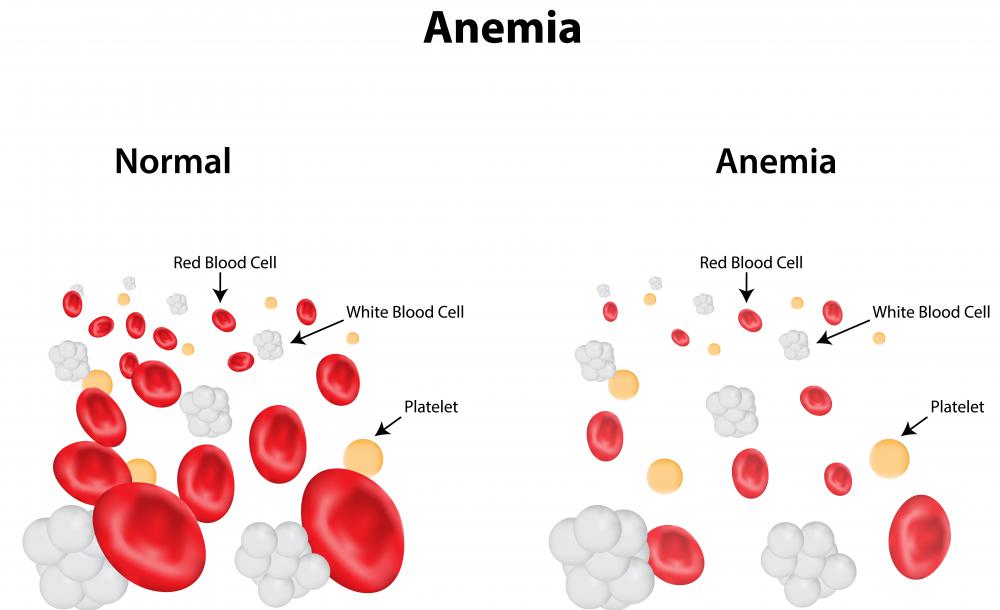At TheHealthBoard, we're committed to delivering accurate, trustworthy information. Our expert-authored content is rigorously fact-checked and sourced from credible authorities. Discover how we uphold the highest standards in providing you with reliable knowledge.
What is Preleukemia?
Preleukemia, also referred to as myelodysplastic syndrome, is a medical condition that involves the bone marrow. When a person has preleukemia, his bone marrow fails to produce an adequate number of healthy, normal blood cells. In such a case, this condition may eventually develop into acute leukemia, which is bone marrow cancer. Unfortunately, scientists have yet to develop a cure for the condition; doctors usually focus on using treatments that minimize symptoms and help prevent complications. In some cases, doctors may even recommend bone marrow transplants as a way of helping patients to live longer lives.
When a person has preleukemia, he may not notice any symptoms at first. In most cases, there are no symptoms while the condition is in the earliest stages. Eventually, recognizable symptoms may develop, including fatigue, shortness of breath, and paleness. A person with this condition may also bruise easily and have more infections than the average person. Some people also develop small red spots under their skin, which are caused by bleeding and are referred to as petechiae.

Preleukemia usually develops when something happens to alter normal blood cell production. When a person has this condition, his blood cells do not develop normally and end up dying either while they are still in the bone marrow or after they enter his blood. As time goes on, the defective cells build up and begin to outnumber the patient's healthy cells. The result of this disruption is often frequent infections and abnormal bleeding. A person with this condition may also develop anemia.

Sometimes doctors diagnose preleukemia but aren't sure what caused it. In other cases, doctors may pinpoint such causes as chemotherapy and radiation as well as exposure to certain chemicals. Interestingly, preleukemia that does not have a known cause may be easier to treat than forms of the condition that develop because of factors doctors can pinpoint.

Since there is no cure for the concition, treatment often focuses on supporting the patient's health and managing his symptoms. Treatment may also include efforts to help prevent it from developing into acute leukemia. Blood transfusions are sometimes used to replace unhealthy blood cells, and various medications may be prescribed to help increase the number of healthy blood cells. In some cases, patients undergo bone marrow transplants, which involve using drugs to destroy unhealthy blood cells and then replacing the defective bone marrow with a healthy transplant.
AS FEATURED ON:
AS FEATURED ON:















Discussion Comments
I have had pre-leukemia for 12 years, with no chemo treatment. The only treatment I am getting is that they drain a pint of blood from me each month, and after 12 years, I am doing fine. There is a high risk of developing acute leukemia if chemo treatment is administered, but doctors don't tell anyone this.
The best thing to do is if a doctor suspects that a person has leukemia is to seek a second opinion from another oncologist, one who is with another group of doctors than the one you are seeing. Unfortunately, doctors kill with their quick judgment to administer drugs and chemo.
Avoid breathing anything containing benzene. Gasoline, burning coal fumes and many everyday products are laced with this blood cancer causing product. Some people like the smell of gas when filling their car. There is still benzene in our gas. Set the automatic nozzle clip and stand back.
Many states require stations to have the rubber vapor recovery boots that cover the fuel neck which draw the fumes back up the hose and keep it away from people. Keep yourself and your family safe. Fill up without the kids. Stay healthy.
My dad is 90 and last winter had a blood transfusion to perk him up after months of feeling weak. He was a life long smoker since his teens but hasn't for a couple of years now - does have some emphysema. Since last winter he drinks "Boost" every day, feels stronger has better color, but still has heavy breathing with any movement. His doctor has now, after doing blood work, told us dad has pre leukemia and can only slow it down with prednisone. At 90 we all knew that something might happen to dad sooner or later. And I realize no one has a crystal ball to predict his future with.
The best diagnostic procedure is aspiration of bone marrow white count is done by a hematologist, M.D.
@burcinc-- My dad has myelodysplastic leukemia. He's still in the early stages and taking medications.
Like @feruze said, a bone marrow test will be necessary for diagnosis. Then you will be given medications that help the body produce blood cells. There are several different kinds of medications out there. Unfortunately, the doctors say that medications will not be enough in the long term. As the condition develops, different types of medications, chemotherapy and lastly, blood transfusions will be necessary.
You can't prevent it the condition from developing, but you can delay it with medications.
@burcinc-- When you say your blood cell counts are low, how low?
I don't think you should scare yourself too much about what might be going on at this point. When you go to the hematologist, he will most likely run another blood test to compare test results. Sometimes blood cell counts may fall temporarily during illness and then improve.
If the doctor finds that your blood cells are constantly in the low range, he may order a bone marrow test. He may also ask for an ultrasound of your spleen. An enlarged spleen is another symptom of bone marrow disease. If you do indeed have preleukemia, the bone marrow test and the ultrasound will diagnose you and you can start treatments for it.
At this point, go to your appointment without any preconceived notions. I hope you don't have anything. But if you do, it's still great that it was caught early and you can prevent it from getting worse.
I asked him what this all means and he said that I might have myelodysplastic anemia, a.k.a. preleukemia. That word "preleukemia" was enough to send chills down my spine and I've been feeling very scared since I heard this.
Has anyone experienced something like this? What should I expect with my appointment with the hematologist? Will he make the diagnosis and tell me whether I have preleukemia or not? Do I need bone marrow testing?
If you have any insight to share with me, I would really appreciate it.
Post your comments